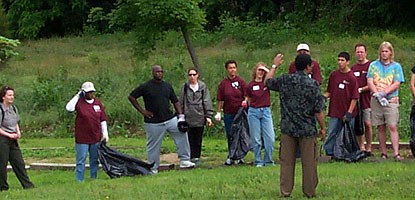By Serena Mao
A whopping 1.6 million voluntourists––tourists volunteering on vacation––visit a wide range of countries annually. Whether they aspire to act as a role model for lonely orphans, repaint the interior of dusty schoolhouses, or construct homes from the ground up for needy families, these visitors all have a single goal in mind: to leave a positive impact on the destination location. Unlike the typical vacationer traveling for their own pleasure, voluntourists desire to utilize their skills to improve the lives of those in need. Taking a simple glance at these attractive opportunities makes people glow in an eagerness to display their kindness. However, a deeper look into these seemingly good-hearted travel plans reveal a whole plethora of negative effects.
Teaching and interacting with orphans are commonly seen in voluntourism trips. Foreigners love watching the well-worn faces of tiny children light up as they arrive, wrapped in hugs and warm greetings. Unknown to the naive visitors, orphanages often create artificially dilapidated conditions, hoping to pull on heartstrings and encourage extra donations. Research has also uncovered cases where children that have parents are “rented” off to the orphanage for the time period. Even worse, the sweet smiles and embraces of the orphans are of genuine affection, but in turn, these bonds are inevitably severed as the short-lived visit terminalizes. As a result, volunteers are only exposed to the love and warmth showered upon them when they remain, but are unaware of the attachment disorders that suddenly develop in the emotionally unstable children. Orphans must maintain a stable and reliable bond with their caregivers, rather than being exposed to situations that leave them mentally shaky. Voluntourism results in precisely the opposite effect.
Some of the most common voluntourism projects include assisting the local people in tiring tasks that require either strenuous or detail-oriented human labor. Organizations often assist in building houses, painting schools, or even carefully picking rocks out of buckets of beans. Volunteers take pride in completing these tasks, believing that they have expedited the completion of a difficult activity.
In fact, they become an unnecessary and inefficient addition to the project. Foreign voluntourists tend to forget that there are local experts specialized in the specific task they are assisting with. Visitors are often unskilled or incapable of the job, necessitating tedious training that would be unnecessary for skilled local specialists. Often, the effort spent educating the foreigners is equal or more to that needed for others to just finish the project directly. In other cases, the training is not enough. As a result, the locals must disassemble a structurally incompetent building and reassemble it discreetly to maintain the visitors’ perception of their positive impact. This can even continue for days on end, with the volunteers building during the day, and local specialists undoing and redoing the “progress.”
When the task is completed accurately and efficiently however, it is still foolish to think that the community is better off. Their typical work opportunities taken away from them, local experts are left without a paid job for weeks. Unable to earn money to raise their families, they struggle financially. Besides, organized voluntourism projects are often isolated and removed from a large scale strategy. Constructing an isolated library contributes nothing to the community if not integrated within a greater plan. In some instances, schools have even been built with no money left to pay for the teachers. A voluntourism accomplishment can be compared to a single Lego: with no others to accompany or cooperate with, a lonely plastic brick does not present any value.
Voluntourists are the vacationers with the most admirable morals, and yet, they can potentially leave the deepest negative impacts. Before embarking on trips that appear charitable on the surface, many tourists are ignorant, failing to notice the devastating consequences of their activity. It is tempting to think that maintaining a caring heart is all there is to making a positive difference, but voluntourism presents an effective counterexample.
 Tempus Magazine By Students, For Students
Tempus Magazine By Students, For Students 



